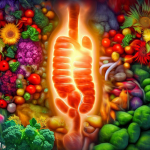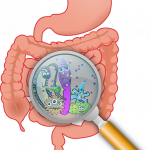Gut health is a crucial aspect of overall health and well-being. The gut, also known as the digestive system, plays a vital role in breaking down food and absorbing nutrients. It also houses trillions of bacteria that help maintain a healthy immune system and prevent disease.
However, when the gut is not functioning properly, it can lead to various health issues, including constipation. In this blog post, we will focus on natural ways to relieve constipation and improve gut health.
What is Constipation?
 Constipation is a common digestive issue that affects millions of people worldwide. It is characterized by infrequent bowel movements or difficulty passing stools. According to the National Institute of Diabetes and Digestive and Kidney Diseases (NIDDK), constipation is defined as having fewer than three bowel movements per week.
Constipation is a common digestive issue that affects millions of people worldwide. It is characterized by infrequent bowel movements or difficulty passing stools. According to the National Institute of Diabetes and Digestive and Kidney Diseases (NIDDK), constipation is defined as having fewer than three bowel movements per week.
Symptoms of constipation include bloating, abdominal pain, and discomfort. Chronic constipation can also lead to hemorrhoids, anal fissures, and rectal prolapse. Moreover, constipation can negatively impact gut health by disrupting the balance of bacteria in the gut.
Causes of Constipation
Several factors can contribute to constipation, including:
– Lack of fiber in the diet: A diet low in fiber can cause stools to become hard and difficult to pass.
– Dehydration: Not drinking enough water can lead to dry stools that are hard to pass.
– Sedentary lifestyle: Lack of physical activity can slow down digestion and lead to constipation.
– Medications: Certain medications such as opioids, antacids, and antidepressants can cause constipation.
– Medical conditions: Conditions such as irritable bowel syndrome (IBS), hypothyroidism, and diabetes can cause constipation.
Benefits of Improving Gut Health
Improving gut health has numerous benefits for overall health and well-being. Some of these benefits include:
– Improved digestion: A healthy gut can break down food more efficiently, leading to better digestion and nutrient absorption.
– Boosted immune system: The gut houses trillions of bacteria that help maintain a healthy immune system and prevent disease.
– Better mental health: The gut-brain axis is a complex communication network between the gut and the brain. A healthy gut can improve mood and reduce symptoms of anxiety and depression.
– Reduced inflammation: Chronic inflammation is linked to various health issues, including heart disease, cancer, and autoimmune disorders. A healthy gut can reduce inflammation in the body.
– Lower risk of chronic diseases: A healthy gut is associated with a lower risk of chronic diseases such as obesity, type 2 diabetes, and colorectal cancer.
Foods to Eat for Gut Health
Eating a diet rich in fiber, probiotics, prebiotics, and fermented foods can improve gut health. Some examples include:
– High-fiber foods: Whole grains, fruits, vegetables, nuts, and seeds are all excellent sources of fiber that can promote regular bowel movements.
– Probiotic-rich foods: Yogurt, kefir, sauerkraut, kimchi, and miso are all examples of probiotic-rich foods that can improve the balance of bacteria in the gut.
– Prebiotic foods: Prebiotics are types of fiber that feed the good bacteria in the gut. Examples include garlic, onions, leeks, asparagus, and bananas.
– Fermented foods: Fermented foods such as kombucha, tempeh, and pickles contain beneficial bacteria that can improve gut health.
Foods to Avoid for Gut Health
Certain foods can disrupt the balance of bacteria in the gut and lead to constipation. These include:
– Processed foods: Processed foods are often low in fiber and high in sugar and unhealthy fats.
– High-fat foods: High-fat foods such as fried foods and fatty meats can slow down digestion and lead to constipation.
– Sugary foods: Sugary foods can disrupt the balance of bacteria in the gut and lead to inflammation.
– Artificial sweeteners: Artificial sweeteners such as aspartame and sucralose can disrupt the balance of bacteria in the gut and lead to digestive issues.
– Alcohol: Alcohol can dehydrate the body and lead to constipation.
Natural Remedies for Constipation
Several natural remedies can help relieve constipation, including:
– Drinking more water: Staying hydrated can soften stools and make them easier to pass.
– Increasing fiber intake: Eating more fiber-rich foods or taking a fiber supplement can promote regular bowel movements.
– Taking probiotics: Probiotics can improve the balance of bacteria in the gut and promote regular bowel movements.
– Using herbal remedies: Herbal remedies such as senna, cascara sagrada, and aloe vera can help relieve constipation.
– Trying acupressure: Acupressure is a form of massage that can stimulate the bowels and promote regular bowel movements.
Lifestyle Changes to Improve Gut Health
In addition to dietary changes, certain lifestyle changes can improve gut health. These include:
– Exercising regularly: Regular exercise can improve digestion and promote regular bowel movements.
– Managing stress: Chronic stress can disrupt the balance of bacteria in the gut. Practicing stress-reducing techniques such as meditation or yoga can improve gut health.
– Getting enough sleep: Lack of sleep can disrupt digestion and lead to constipation. Aim for 7-8 hours of sleep per night.
– Avoiding smoking: Smoking can disrupt the balance of bacteria in the gut and lead to digestive issues.
– Limiting alcohol consumption: Excessive alcohol consumption can dehydrate the body and lead to constipation.
In conclusion, improving gut health is crucial for overall health and well-being. Constipation is a common digestive issue that can negatively impact gut health.
However, natural remedies such as increasing fiber intake, taking probiotics, and making lifestyle changes such as exercising regularly and managing stress can help relieve constipation and improve gut health. By making small changes to your diet and lifestyle, you can promote a healthier gut and overall well-being.








